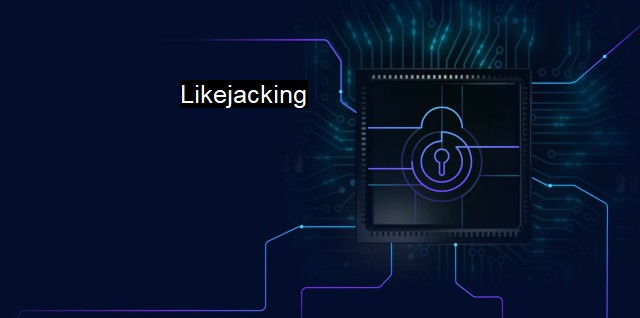What is Likejacking?
Social Media Likejacking: The Fast-Growing Trend of Cybercriminals Spreading Malicious Content
"Likejacking" is a term in the realm of cybersecurity which refers to a malicious technique used by hackers to exploit Facebook’s "like" feature to spread malware and scams. The term "Likejacking" is a portmanteau of 'like' – pertaining to the Facebook like button – and 'hijacking' – denoting the unauthorized control over something.On the surface, 'Likejacking' appears to be a relatively simple and harmless action. When a user likes a Facebook page or post, it creates a digital signal which could have different implications. In straightforward terms, the activity of liking a post or a page would actively express appreciation or interest towards the shared information. on the darker side of digital world, these liked posts become inadvertent promotional tools.
While most users like posts or pages innocently to express regard or approval, scammers manipulate this feature to facilitate nefarious activities. In the process of Likejacking, scammers create a webpage with an enticing image, link, or story to attract users. The page will often have an embedded, invisible 'Like' button. The user, believing they are simply clicking to see more of a story, inadvertently ‘likes’ the camouflaged post or page.
Every time a user unknowingly clicks on the 'Like' button, the scam gets automatically posted on their timeline. It may appear to the user's friends that they have endorsed the site or content, making it more likely for an additional set of people to click on it. the scam spreads in the same vein as a real virus would, from person to person. It is like a widespread net that could potentially reach thousands, or even millions of users.
All this process may seem fairly benign, just a case of false advertisement perhaps, but the real danger of Likejacking lies in the hacker's ability to get control over the user's system, their personal data, and even potentially their financial information. With access to the user's device, the hacker can cause significant harm. This could involve embarrassment, identity theft, financial loss or even more serious cybercrimes.
The deceptively simple 'Like' button has proven to be an effective tool for spreading malware and spyware applications. Some Likejacked pages may trigger the download of a malware or spyware application which can gain access to personal and sensitive information, or even give control of the user’s device to the hacker.
The role of antivirus software proves to be pivotal in combating threats like these. An effective antivirus can identify and block malicious websites, limit the download of spyware or malware, and monitor the overall health of your system.
With the sophistication and unpredictable nature of cyber threats today, being cybersecurity literate and discerning online is perhaps as important as having powerful antivirus software. Suspicion plays a crucial role - before clicking on a link, it is beneficial to think twice. Checking content creditability, remaining skeptical of incredible promises or eye-catching giveaways, all play a role in avoiding getting likejacked.
To summarize, Likejacking is another form of cyber threat that manipulates our social networking behaviors for illicit gains. While antivirus software play a significant job providing a first line of defense, users must guide their behaviors thoughtfully in the digital space. Our digital engagements leave us exposed to potential threats and, just as we would lock our physical doors, we must also keep our virtual ones secure.

Likejacking FAQs
What is likejacking?
Likejacking is a type of cyber attack that takes advantage of the Facebook "Like" button to trick users into clicking on malicious links. It disguises links with fake content that appears to be legitimate, but when clicked, it redirects the user to external websites that can install malware, steal personal information, or spread spam.How does likejacking work?
Likejacking works by using JavaScript code to create invisible buttons on top of legitimate Facebook content. When a user clicks on the visible content, they unwittingly click on the invisible button as well, which triggers the "Like" action and shares the content with their friends, perpetuating the attack.How can I protect myself from likejacking?
To protect yourself from likejacking, you can use browser extensions or add-ons that block JavaScript code, such as NoScript or ScriptSafe. You should also be wary of clicking on unfamiliar or suspicious links on Facebook, and avoid liking or sharing content that seems too good to be true.What should I do if I suspect that I have been likejacked?
If you suspect that you have been likejacked, you should immediately remove any unfamiliar or suspicious posts from your Facebook feed and change your account password. You should also run a virus scan on your device to check for any malware infections, and consider reporting the incident to Facebook or local law enforcement agencies.| | A | | | B | | | C | | | D | | | E | | | F | | | G | | | H | | | I | | | J | | | K | | | L | | | M | |
| | N | | | O | | | P | | | Q | | | R | | | S | | | T | | | U | | | V | | | W | | | X | | | Y | | | Z | |
| | 1 | | | 2 | | | 3 | | | 4 | | | 7 | | | 8 | | |||||||